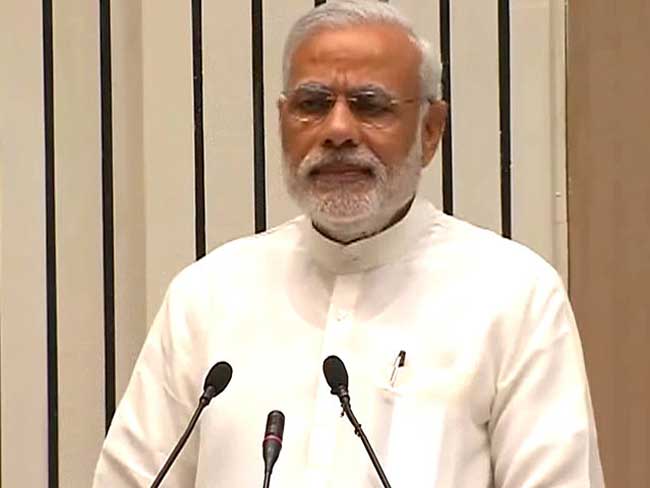New Delhi: On the 40th anniversary of Emergency on Thursday, Prime Minister Narendra Modi hit out at the Indira Gandhi government, saying that the nation was bound with chains and turned into a jail then due to “lust for power”.
A day after Union Cabinet chaired by him decided to set up a national memorial for socialist icon Jai Prakash Narayan in his birthplace in Bihar, the Prime Minister said that the memorial will always be an inspiration to democracy-loving citizens of the country.
“Nobody can forget June 25-26 in the history of India. 40 years back, the country was bound with chains of Emergency and turned into a jail for the lust for power.”
“Lakhs of patriots nursing the dream of ‘Sampoorna Kranti’ under the leadership of JP were jailed. Newspaper offices were locked and the radio aired only what the government then wanted,” Modi said without naming then Prime Minister Indira Gandhi.
He was speaking at the launch of Smart Cities Mission, Atal Mission for Rejuvenation and Urban Transformation and Housing for All Mission here.
Holding that people have gathered today to take a vow to move forward together, the Prime Minister said, “We want to persevere those dreams so that every citizen prospers under that democratic system.”
Expressing happiness over the Cabinet’s decision to set up a memorial for JP, he said that the memorial will always be an inspiration and guiding light for democracy lovers and citizens of this country.
He said that the government wants to constantly try and find out how can the schemes of development be carried out with the cooperation and participation of people.
Inaugurating a two-day conference, he reached out to the “urban India” as he announced the government’s plans for a better city life.
BJP chief Amit Shah is expected to speak on the issue of Emergency in the evening in a programme here.
On the eve of 40th anniversary of imposition of Emergency, the government had on Wednesday decided to set up a national memorial for JP in his birthplace in Bihar where Assembly polls are likely this September-October.
Announcing a number of decisions of the government to honour JP, who had spearheaded the fight against Emergency imposed by then Prime Minister Indira Gandhi in 1975, Home Minister Rajnath Singh had yesterday recalled how democratic institutions were “muzzled” during Emergency as he lauded the contribution of the socialist leader in uniting the country against the “black chapter” of Indian history.
Pitching for a “bottom-up model” of city development, Modi said that a model for such development should not be thrust from the top.
“It should be bottom up. A smart city means a city which is two steps ahead of the basic necessities of a resident,” he said.
“Now private property developers decide a city’s growth. But often roads and drainage are not built when they lead the development. The city’s residents and leadership should decide how a city should grow,” the Prime Minister said.
Modi said, “This scheme would ensure that the city’s leadership takes charge of the development. Otherwise there remains a mismatch…our development should not create a conflict between our cities and the villages.”



